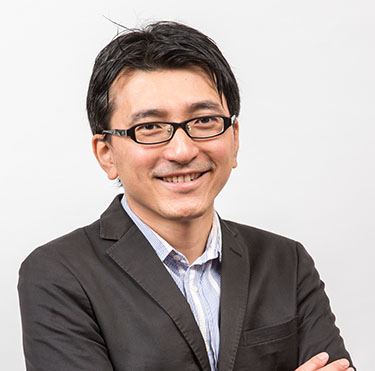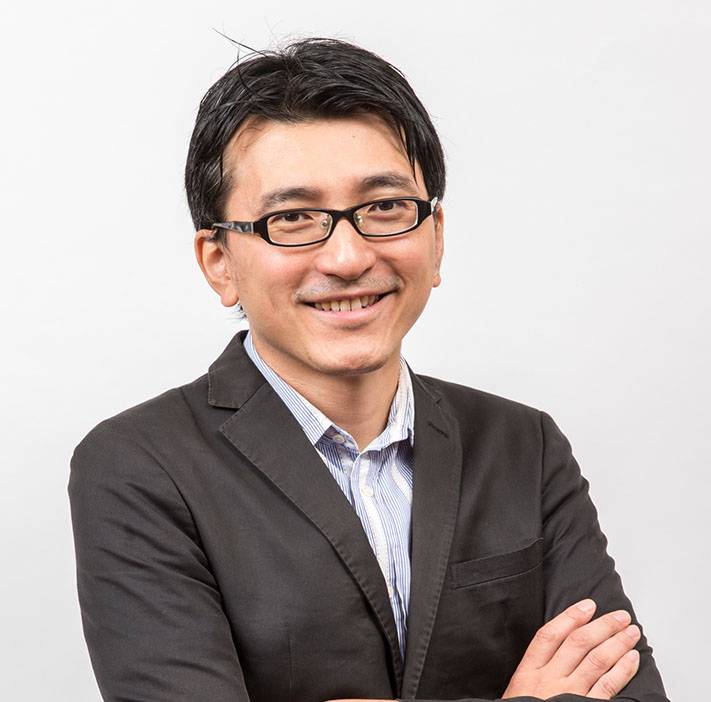09

College of Information Science and Engineering
Professor Tadahiro Taniguchi
Interview date: October 5, 2020

Contents
The future of university classes
What impact has the COVID-19 pandemic had on your classes?
Spring semester classes were shifted online, so I had to teach my seminars while dealing with several restrictions. In my informatics lab, my students were able to conduct theoretical research, but they struggled researching topics like robotics, robot-human interaction, and interpersonal communication.
As with the shift of manufacturing to online processes, there are things you can and cannot do with today’s technology. Once again, I was made painfully aware of the need to understand the division between these two.
What challenges did you face in teaching online classes?
You cannot engage in informal communication like chatting. Communication is often thought of the conveyance of information between a sender and a receiver, as in telecommunications, but that alone does not constitute interpersonal communication.
This is called the Shannon-Weaver model of communication. With Zoom and other similar tools, we purposefully set a time to talk about a certain topic, and then try to use that time to communicate something. There are speakers and listeners who are connected by a single audio channel.
But this is not what I’m talking about. When we engage in idle banter in everyday life, there are multiple conversations going on at the same time. This can get others involved in a conversation and help build interpersonal relationships.
Until the pandemic, this kind of informal communication was the grease that kept organizations, such as laboratories and companies, running smoothly. In science, teamwork is extremely important, so I have to think about how to encourage teamwork while managing my lab online.
Based on these issues, how do you plan to teach your classes in the fall?
In the fall, I want to provide my students with more in-depth support. Research is inherently uncertain in that you never know when it will yield a result or meaning.
So, if students lose their motivation, they stop making progress. I think we need to support students who have lost the ability to engage in creative research due to emotional stress.
These students can be helped by the fact that they are a member of a community, so I want to be able to approach them and refer them to someone who can help them. I am thinking about adopting a chat app called Discord. You can make several rooms, and students can actually talk to each other instead of texting.
How will the fields of AI and robotics change
in the post-COVID world?
What impact has COVID-19 had on AI and robotics, which are your areas of expertise?
Even before the pandemic, these fields were heading toward a boom, so I think we will continue seeing progress. In this sense, I think scholars should continue steadily pursuing their research without letting the pandemic get in the way.
In relation to the pandemic, I think demand will increase for research into teleoperations and teleexistence. Teleexistence is the concept of using an avatar as a surrogate for yourself so you can feel as if you exist at a place other than where you actually are.
When it comes to substituting remote-controlled robots or telexistence for real-life activities, for the sake of our future, we will need to have a discussion about “what is lacking” and develop the information technology to fill that void. We will also need to develop a deeper understanding of human communication.

What do you mean about discussing “what is lacking”?
As online and remote technologies advance, instead if shifting everything online or to remote operation, we will need to look at those informal aspects that could be lost in the process.
For example, some people are starting to offer virtual school trips, but isn't the essence of a school trip to visit actual places? Although the formal objective of a school trip is to go to a place and learn about it, the informal aspects, like having a pillow fight with your friends in the middle of the night, might be more important life experiences.
Often times, the formal only exists because of the informal. These informal aspects are closer to the essence of what makes us human. When we shift activities online or to remote operation, it is important to focus on informal communication and discuss the balance between what can and cannot be shifted online.
So, the key is ensuring as much informal communication as possible remains?
Yes. It may not be the best turn of phrase, but I think it is important to be within “punching distance” when communicating with someone. If you say something the other person doesn’t like, they might punch you!
In other words, it seems to me that there is a kind of fundamental social foundation that forms the basis of communication when a situation could be potentially life-threatening. When you are within punching distance, biological communication, such as reading facial expressions and becoming humble, can occur.
Communication is not just verbal. When we are online, however, we are no longer within punching distance, so we can stay in our own safe zones. The conversations we have online differ from those we have offline.
We might need to analyze those differences to get a better understanding of the strengths and weaknesses of each before choosing an online or an offline setting. It is not acceptable to only engage in the real world, and when we move online, we will need to think about what's missing.
It is important to look at reality, pose hypotheses, and develop our communication styles in detail, rather than promote an online-offline polarization.
I have written a book called Kamogawa Communication School: From Bibliobattle to Artificial Intelligence*. This is a light novel that covers topics like the future of human communication and artificial intelligence, so if this sounds interesting to you, I hope you will read this book and think about what form communication should take.
* Kamogawa Communication School: From Bibliobattle to Artificial Intelligence. Sekai Shisosha, 2019.
In the future, what can universities do and
what can students do at university?
How will the role of universities change in the post-COVID era?
The impression that this series of events left me with is that society as a whole has been able to respond to the spread of an invisible virus and infectious disease. As with infectious diseases, invisible things can only become visible through learning.
It is the job of academia to predict real-life phenomena. This pandemic revealed to me the power of various academic disciplines in that Japanese society as a whole was able to take action from the early stages when there were still few infections.
This is why I realized, once again, the importance of pursuing evidence-based scholarship. As with the human education that supports it, scholarship cannot be created suddenly; must be cultivated gradually like agriculture.
Even though the pandemic has suddenly altered the social landscape, instead of changing course quickly, we must carefully build up a body of work.
In addition, as the AI and IT fields continue to evolve, we will not only need to master the use of ICT tools to create the society of the future, we will also need people equipped with dialectical thinking who can discuss the fundamentals.
Universities will be expected to produce people who can think in this way.

Finally, what should students do going forward?
Even before the pandemic began, the limitations of the conventional Japanese system of hiring fresh graduates en masse and offering lifetime employment were becoming evident. In the post-COVID world, I think it will be increasingly important for people to choose their own paths based on carefully considered decisions.
The key to this will be learning and knowledge. Knowledge is power. I want students to take the knowledge they have gained into the real world and gain even more experience.
We continue to learn even after we enter the workforce. Learning how to learn at university significantly increases the pace at which you can absorb knowledge, and this, I believe, will be an invaluable asset once you start working.
Message
Profile
Professor Tadahiro Taniguchi*
Affiliation: Department of Information Science and Engineering, College of Information Science and Engineering
Position: Professor
Areas of Expertise: Statistical Science, Cognitive Science, Human-Interface Interaction, Intelligent Informatics, Soft Computing, Intelligent Robotics, Affective Informatics, Intelligent Mechanics & Mechanical Systems
*By using Ritsumeikan’s cross-appointment system, Professor Taniguchi is the first university professor in Japan who also works for a company. He is the creator of Bibliobattle.
 MORE INFO
MORE INFO
Other articles





